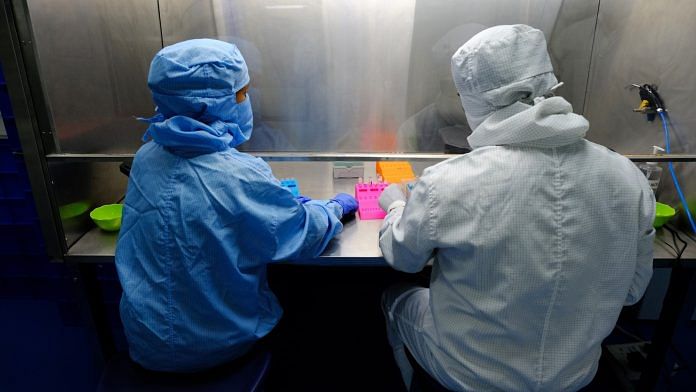New Delhi: Lok Sabha MP Hanuman Beniwal’s two conflicting Covid-19 test reports have raised questions on the efficacy of real-time polymerase chain reaction (RT-PCR) test. In a span of two days, Beniwal’s one report came positive and the other negative.
After testing positive at the Lok Sabha on 11 September, the Rashtriya Loktantrik Party MP from Rajasthan’s Nagaur got a negative Covid-19 report from Jaipur’s Sawai Mansingh (SMS) Hospital Monday.
But it is not unusual for a person to get two different results for RT-PCR tests done in quick succession. A study by researchers at the Johns Hopkins Bloomberg School of Public Health, Johns Hopkins School of Medicine and the National Institute of Allergy and Infectious Diseases looked at the link between false negativity and the days since contracting the infection. The study says that a negative test should not lull anybody into a false sense of security, and, instead, clinical symptoms should be given precedence and precautions taken.
“Care must be taken in interpreting RT-PCR tests for SARS-CoV-2 infection, particularly early in the course of infection, when using these results as a basis for removing precautions is intended to prevent onward transmission. If clinical suspicion is high, infection should not be ruled out on the basis of RT-PCR alone, and the clinical and epidemiological situation should be carefully considered,” said the study funded by National Institute of Allergy and Infectious Diseases, Johns Hopkins Health System, and U.S. Centers for Disease Control and Prevention, published in the Annals of Internal Medicine.
The researchers concluded that the ideal time for RT-PCR test is about eight days after infection. “Over the 4 days of infection before the typical time of symptom onset (day 5), the probability of a false-negative result in an infected person decreased from 100% on day 1 to 68% on day 4. On the day of symptom onset, the median false-negative rate was 38%. This decreased to 20% on day 8 (3 days after symptom onset) then began to increase again, from 21% on day 9 to 66% on day 21,” the study found.
“The false-negative rate was minimized 8 days after exposure — that is, 3 days after the onset of symptoms on average. As such, this may be the optimal time for testing if the goal is to minimize false-negative results.”
While RT-PCR is considered the gold standard in the diagnosis of Covid-19, it is possible that it gives a negative report if a test is done too early. That is why the Indian Council of Medical Research (ICMR) has laid down guidelines on when asymptomatic persons with a history of contact with a Covid-positive patient should be tested.
The study also says, based on statistical analysis, that if a test is done too soon after exposure, the test does not provide any information about whether the person is infected.
India’s testing strategy factors this in to some extent. It says: “Asymptomatic direct and high-risk contacts of a confirmed case to be tested once between day 5 and day 10 of coming into contact.”
Also read: Delhi scientists develop ‘non-fussy’ Covid test, say it’s cheaper & faster than RT-PCR
Problem of false negatives
The RTPCR test is plagued by the problem of false negatives and this has been known for some time now.
In May, in an article in The BMJ, researchers from Bristol Medical School wrote: “No test gives a 100% accurate result; tests need to be evaluated to determine their sensitivity and specificity, ideally by comparison with a ‘gold standard’. The lack of such a clear-cut “gold-standard” for Covid-19 testing makes evaluation of test accuracy challenging. A systematic review of the accuracy of Covid-19 tests reported false negative rates of between 2% and 29% (equating to sensitivity of 71-98%), based on negative RT-PCR tests which were positive on repeat testing. The use of repeat RT-PCR testing as gold standard is likely to underestimate the true rate of false negatives, as not all patients in the included studies received repeat testing and those with clinically diagnosed Covid-19 were not considered as actually having Covid-19.”
Also read: 2 Covid-positive MLAs attend Delhi Assembly after rapid antigen test showed false negative







These tests are highly unreliable or fraud.